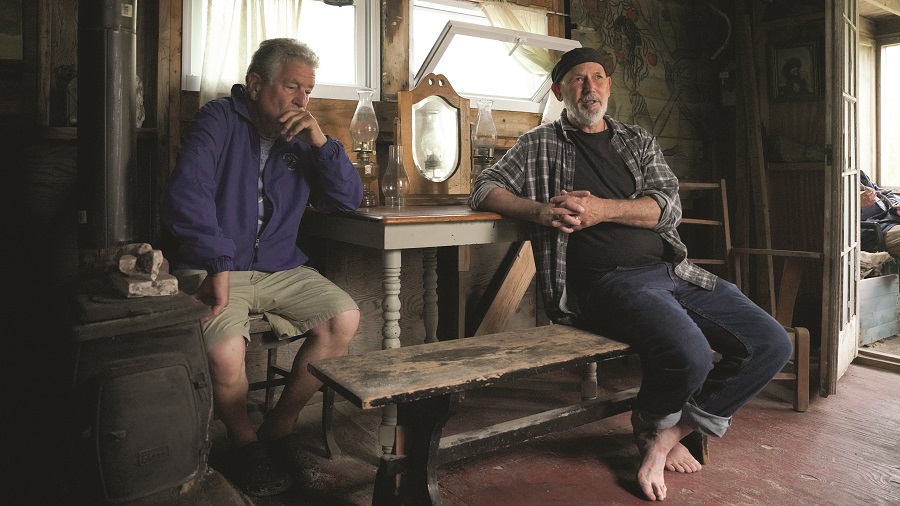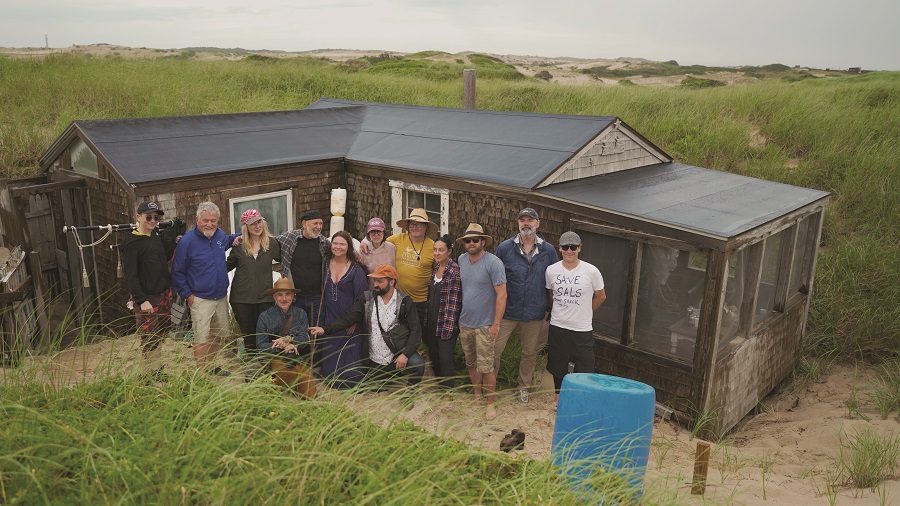PROVINCETOWN — Sal Del Deo, 94, who has spent 77 years caring for and seasonally inhabiting the dune shack he still calls “Frenchie’s” after his friend Jeanne “Frenchie” Chanel, refused an order from the National Park Service this week to remove his personal belongings from the shack and surrender the keys.

Del Deo, an artist and the founder of two Provincetown restaurants, had received a notice in March to quit the shack in 30 days. His son, Romolo, appealed to the Park Service, which extended that deadline to 90 days, a term that expired on June 27.
Instead of turning in the keys, however, the elder Del Deo made a special trip to the shack, where he was met by Romolo, a handful of friends and supporters, and several news media organizations.
“I came here when I was 17 and said to myself, ‘This is the closest I’ll ever get to paradise,’ ” Del Deo said. “It was so different from everything I knew, and it has retained that untouched beauty.”
Del Deo said he would spend his 95th birthday in August here, too. “Maybe I’ll be in the shack, or maybe I’ll be outside, but I’m going to go to the dunes,” he said.
Reporters from the Boston Globe, the Cape Cod Times, and this newspaper were present to cover Del Deo’s eviction. A crew from CNN interviewed Del Deo at his home in town.
But no officers of the National Park Service came to the shack on the 27th to enforce the eviction order.
The state’s Congressional delegation weighed in, however. U.S. senators Ed Markey and Elizabeth Warren and U.S. Rep. Bill Keating issued a joint statement on June 23 urging the Park Service to give Del Deo a temporary special-use permit that would allow him to continue to use the shack, at least for a while.
On the day of the eviction, the lawmakers wrote to the National Park Service again, saying that “Mr. Del Deo’s extraordinary connections to the dunes demand extraordinary consideration.
“Simply stated, there is no benefit in removing Mr. Del Deo and leaving the shack vacant for the summer until a formal RFP process can begin,” the legislators wrote.
“It is vital for the National Park Service to recognize the need for common sense, sensitivity, and compassion while exercising their authority,” the letter continued, “and we again urge the National Park Service to find creative solutions to allow Mr. Del Deo to stay until a public RFP can be completed.”
Asked for a response to the second letter, Park Service spokesperson Tracy O’Toole said that the agency is “continuing to work with” the Congressional delegation “to address their questions and concerns.”
A Lifelong Story
The “extraordinary connections to the dunes” referenced by Markey, Warren, and Keating include not only Del Deo’s decades-long artistic career but also the many achievements of his late wife, Josephine Del Deo, who played a vital role in helping establish the Cape Cod National Seashore.

Her obituary by David W. Dunlap in the New York Times began by recounting the town meeting in 1961 at which she helped persuade Provincetown’s voters to resist the development plans of their own leaders and instead commit the entirety of the town’s Atlantic coast to the new National Seashore.
Years after that vote, Josephine took action again to protect the dune shacks from the Park Service, which had become intent on destroying them to create a more “natural” landscape. By documenting the long history of artistic and literary figures who have used the shacks as a creative refuge, Josephine helped to establish the Dune Shacks of Peaked Hill Bars National Historic District in 2011.
That historic district includes Frenchie’s shack, from which her husband is now being evicted.
“Honestly, when I got the first letter, I assumed it was an error,” Romolo Del Deo told the Independent. “I thought, ‘This can’t be right, and someone has just screwed up.’ ”
Frenchie Chanel built the shack from driftwood in 1942 and owned it when the National Seashore was created in 1961. By that time, Sal Del Deo had already taken over the care and maintenance of the shack from Frenchie, who was about 40 years Del Deo’s senior.
Sal and Romolo built the current version of the dune shack between 1973 and 1975, and Sal’s name is on National Seashore permits for that project, he said. The shack sits on pilings built around Frenchie’s original structure, which is now completely submerged in sand.
When the Park Service concluded its legal taking of the shack by eminent domain in 1973, it granted a “lifetime use stipulation” to both Frenchie and her daughter, Adrienne “Shatzi” Chanel. Left off the document was Frenchie’s other daughter, Jean Schnell Officer, who lives in Tennessee.
Nonetheless, Josephine told her son that as long as Jean was alive, the shack should pass to her, Romolo said.
“My mother understood all these plans; she was deeply engaged,” said Romolo. “She told me we were legally entitled to use the shack as long as there were first-generation heirs to Frenchie. That was the gist of my letter back to the Park Service. ‘No, you’re mistaken, Jean is alive and she wants us to be there. We are not illegally occupying the shack at all.’ ”
The Park Service’s Dune Shack Historic District Preservation and Use Plan, finalized in 2012, specifies that at the end of a “lifetime stipulation,” such as the one Frenchie and Shatzi had, one-year special-use permits should be continually given to “next of kin” until a public leasing process can be concluded.
Those “transition procedures” were meant to give the existing shack custodians a chance to compete for a long-term lease and also ensure that the shack is maintained while that public leasing can be organized.
This is also what senators Markey and Warren and Rep. Keating are now asking the Park Service to do: use their “significant discretion to issue Special Use Permits to allow Mr. Del Deo to remain in the dune shack he has worked in for nearly 80 years.”
Cape Cod National Seashore Supt. Brian Carlstrom has previously told the Independent that he has no such discretion. “My hands are tied” by a federal court order, he said. When asked to provide the court order, NPS spokesperson O’Toole sent a copy of the eminent domain taking from 1973.
At no point has the Park Service explained why it could not follow its own plan and write one-year special-use permits for Jean Schnell Officer, who was Shatzi’s next of kin. That would allow Del Deo to remain as caretaker of Frenchie’s shack until public leasing could take place — at which point he or his family could compete for a 10-year lease on the shack.
A Larger Battle
At the dune shack on Tuesday, Romolo told reporters that what is happening to his father is just “the most insanely ugly example” of a wider failure by the Park Service.

“It’s not just about us here for one more summer,” said Romolo. “What’s happening to the other eight families is just as bad.”
The public leasing of eight other dune shacks is currently underway, and that contest will not be judged on special criteria from the Preservation and Use Plan designed to protect the historic district. It does, however, include the option to bid far above assessed market rents in an effort to beat out competitors.
Protesters on Route 6 and the select boards of Provincetown and Truro have argued that wealth should not determine dune shack leases.
At his dune shack on Tuesday, Sal said the same.
“All of you younger people are going to be denied this great privilege, unless you have a lot of money,” Sal said to the assembled friends and reporters. “That really is the nub of the whole problem. It’s making money off a way of life we started, many, many of us, all the way back to Eugene O’Neill’s time.”
State Senator for the Cape and Islands Julian Cyr, who is from Truro, and state Rep. Sarah Peake, who is from Provincetown, are meeting with senior staff of the Dept. of the Interior on Thursday, June 29, along with staff from the offices of Markey, Warren, and Keating, Cyr told the Independent on Tuesday night.
They plan to argue that the selection criteria the Park Service has issued should not be considered equally, and that “rent offered” should be de-emphasized while “experience” should be weighted heavily.
“It’s not every day that state legislators get an audience with senior officials at a federal agency, and we’re planning to take full advantage of the opportunity to defend our constituents,” Cyr said.



